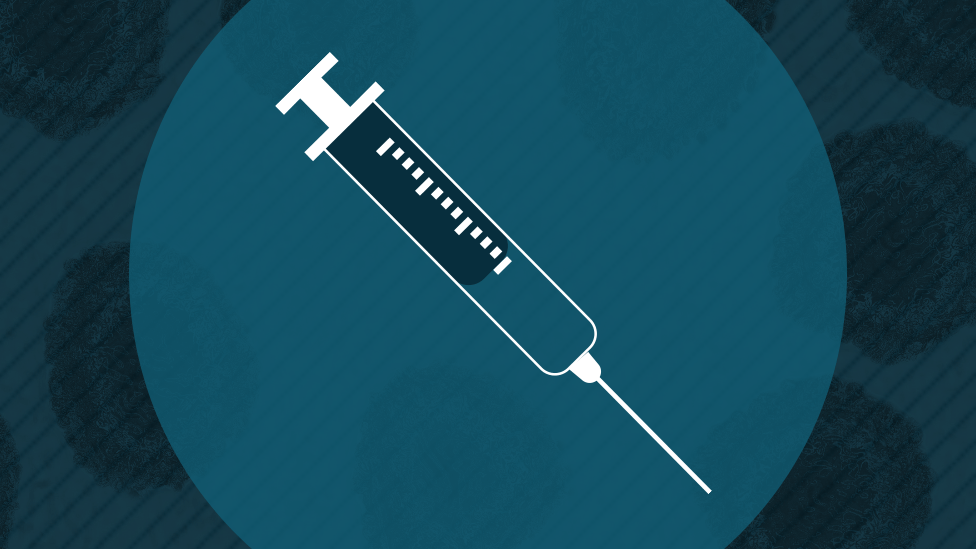Covid-19 vaccination: How will the rollout work in Wales?
- Published
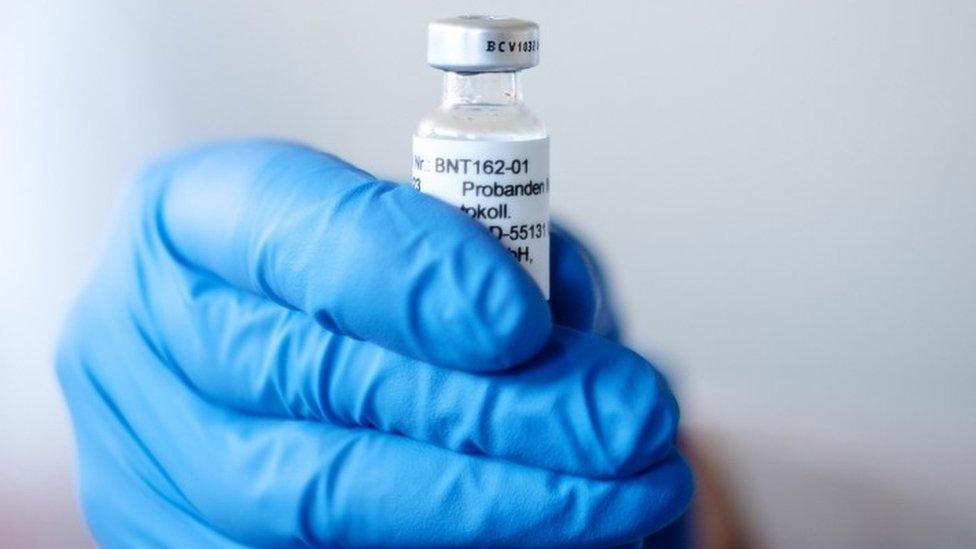
"It is tremendously exciting that only nine months on from the declaration of the pandemic, we have vaccines available to offer"
With up to 1.4 million people in line to get a Covid-19 vaccine in Wales in the months ahead, officials say it will be one of the biggest health programmes ever mounted.
The UK has become the first country in the world to approve the Pfizer/BioNTech coronavirus vaccine for widespread use.
The Medicines and Healthcare Products Regulatory Agency says the jab, which offers up to 95% protection against Covid-19 illness, is safe for use.
But how will it be rolled out?
Preparations in Wales started in June and the Welsh Government hopes the first vaccines will be given within seven to 14 days.
To start with, everyone over 50 will be offered the vaccine in the coming months.
Here we ask those behind the rollout what we should expect.
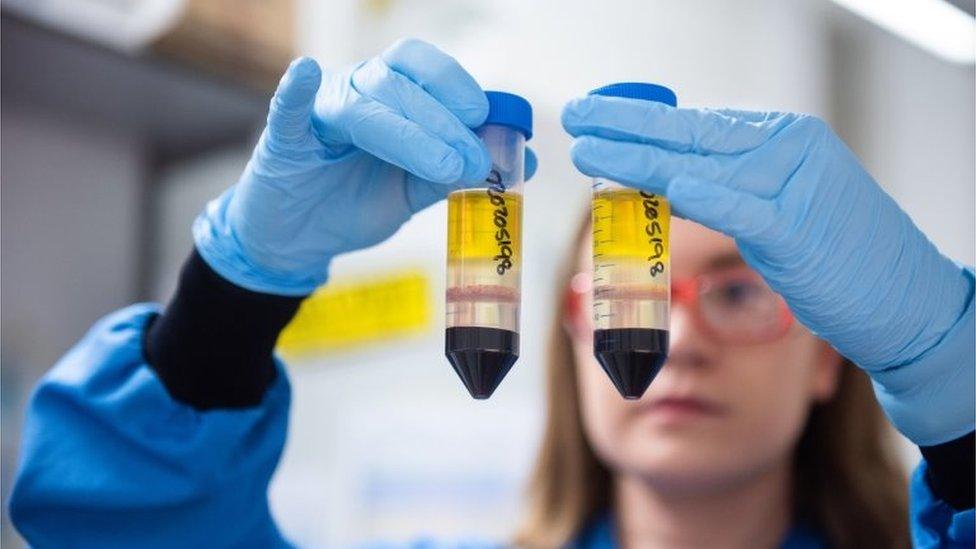
There are a number of different vaccines in development with different ways of storage and administration
What are the vaccines?
There could well be seven different vaccines, eventually.
The first available is the mRNA vaccine from Pfizer/BioNTec. The UK government has bought 40 million doses.
Each person getting this vaccine will need two doses, three weeks apart. Wales will get a share of around 4.8% based on its population.
The next will be the AstraZeneca/Oxford vaccine and there will be many more doses of this available, with the UK government having ordered 100 million doses.
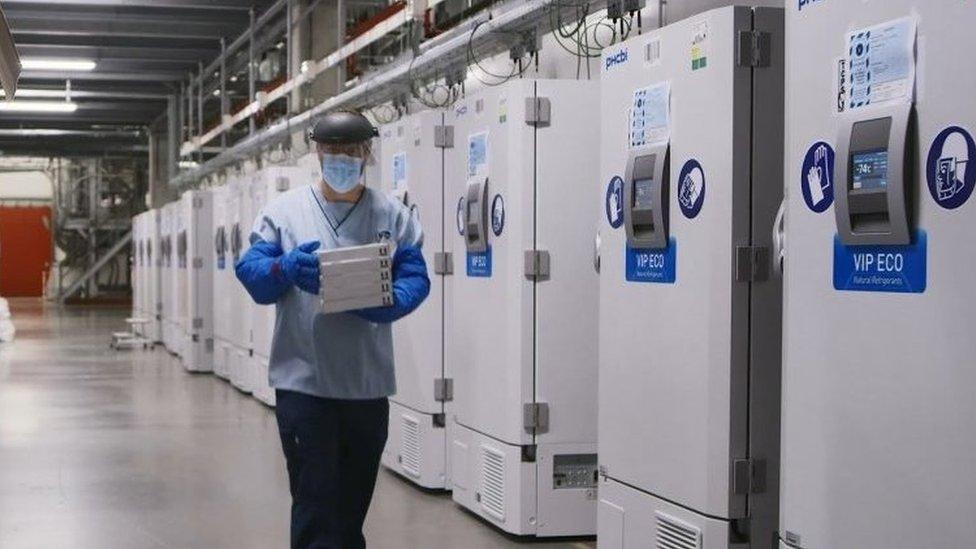
Freezers holding doses of the mRNA vaccine, which will be the first to be rolled out
What's the challenge?
The mRNA vaccine has to be stored at -75 C and also transported at that sub-zero temperature to the central locations where it will be used.
There may be some transportation possible at normal refrigerated temperature, which would enable it to be taken to care homes, but otherwise it will require those on the priority list to get to special vaccination centres.
The vaccines - in nearly 1,000 doses per package - have to be used within five days once opened. And the thawing and preparation process can take up to five days from when they arrive.
"It is tremendously exciting that only nine months on from the declaration of the pandemic, we have vaccines available to offer and a system in place to offer them," said Richard Roberts, head of the vaccine preventable disease programme at Public Health Wales.
"Some will be able to travel but some we would want to stay where they are - a care home for example. If we can solve that problem of transporting the vaccine but when the AstraZeneca/Oxford vaccine comes online, that's a vaccine which we store in the fridge, we can move it around and it lasts six months."
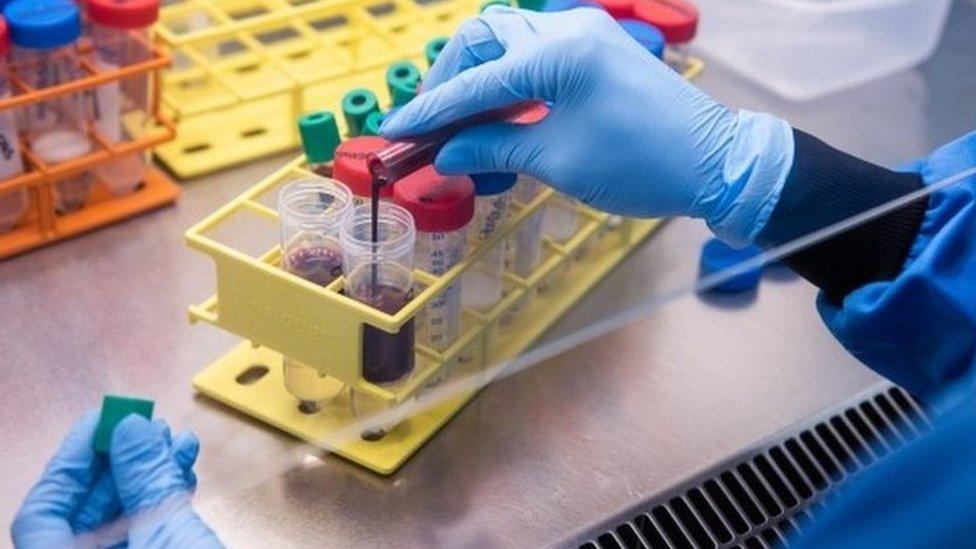
About 60% of the Welsh population will be offered the vaccine at first
Who exactly will get the vaccine?
Older, more vulnerable people and care home staff will be among the first to receive it. The Welsh Government will split the population into age groups to determine priority, based on advice form the UK Joint Committee on Vaccination and Immunisation (JCVI).
The order of priority is set to be:
Older residents in care homes and care home workers
All those 80 years and over and health and social care workers
All those 75 years and over
Those 70 and over, and clinically extremely vulnerable people, external - including those with cancer and kidney disease
All aged 65 and over
All individuals aged 16 to 64 with underlying health conditions which put them at higher risk of serious disease and mortality
All those 60 years and over
All those 55 years and over
All those 50 years and over
The 40% remainder of the population, with order of priority to be determined
The priority 10 groups represent 60% of the population but also 99% of all deaths linked to Covid-19.
More information about the vaccine from Public Health Wales, external
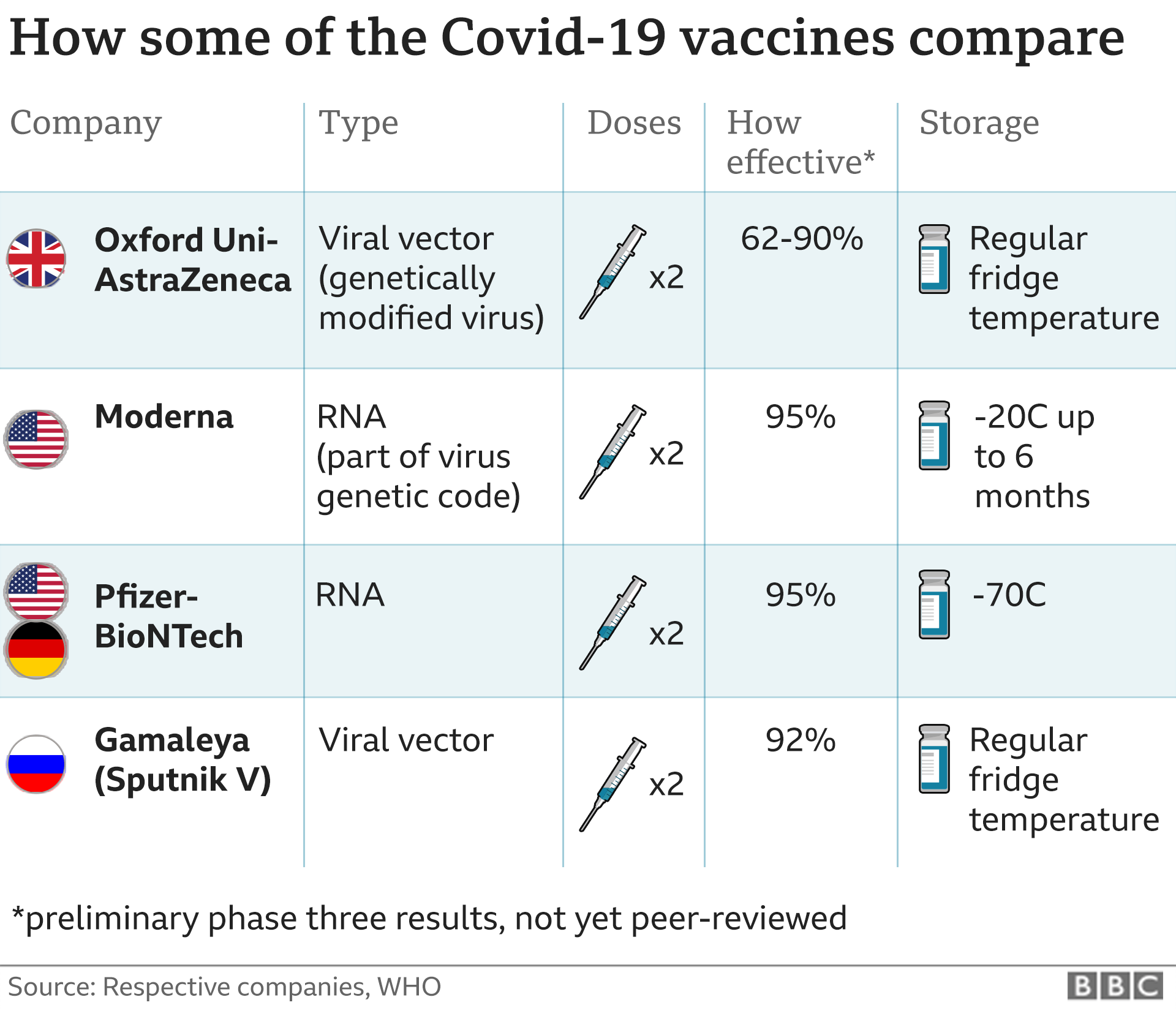
Two full doses of the Oxford vaccine gave 62% protection, a half dose followed by a full dose was 90% and overall the trial showed 70% protection.

How long will it take?
For context, around 900,000 flu vaccines were given over a period of 10 to 12 weeks last year - there are 1.4 million in the priority groups for the Covid vaccines.
"Although more complex because community locations are being used and the logistics with the vaccine, if we can match volume of delivery that we achieve with flu, then it will mean we will be able to roll out as quickly as possible," said Dr Roberts.
How will I know when it's my turn?
You will be told.
In the Cardiff and Vale health board, for example, Fiona Kinghorn, executive director for public health, said: "We are already planning how we might vaccinate those in sequence, and different groups at the same time, and we'll call them, so when we are ready to vaccinate, they will receive a letter, and then in Cardiff and Vale, they will be able to ring our booking centre and book an appointment that is convenient for them."
It's really going to provide that hope that we can get back to normal. It protects the person but does it prevent transmission? That's the question scientists will need to answer.
Where will I need to go?
Each health board will get its share and vaccines will go across Wales at the same time. Mass vaccination centres will be set up - particularly for the mRNA vaccine, which needs to be kept a very low temperatures.
Cardiff and Vale health board has already said its mass vaccination centres will be at Splott and at leisure centres in Pentwyn and Barry.
Officials say each site will have tight security and the vaccines will be guarded "like a VIP", as well as cyber and IT security measures being taken.
Gill Richardson, chief adviser to the chief medical officer, said: "It's been an incredible logistical exercise - we tested our pharmaceutical logistics colleagues but they've worked tirelessly to ensure there's an effective and safe vaccine across Wales.
"The vaccine can't be transported once it's diluted, it has to be used on the site. This is a vaccine that needs to be made up. It's not like the flu vaccine, where it comes ready-made and in single doses. It will be in vials which can serve five doses and it will be delivered so it can be used at those mass centres."
How long will it take?
Health officials would like to see "thousands rather than hundreds" vaccinated in the first few weeks. It's likely those vulnerable and shielded people and those with chronic conditions, who would normally get the flu vaccine, will also be slotted in too as it is rolled down the age groups.
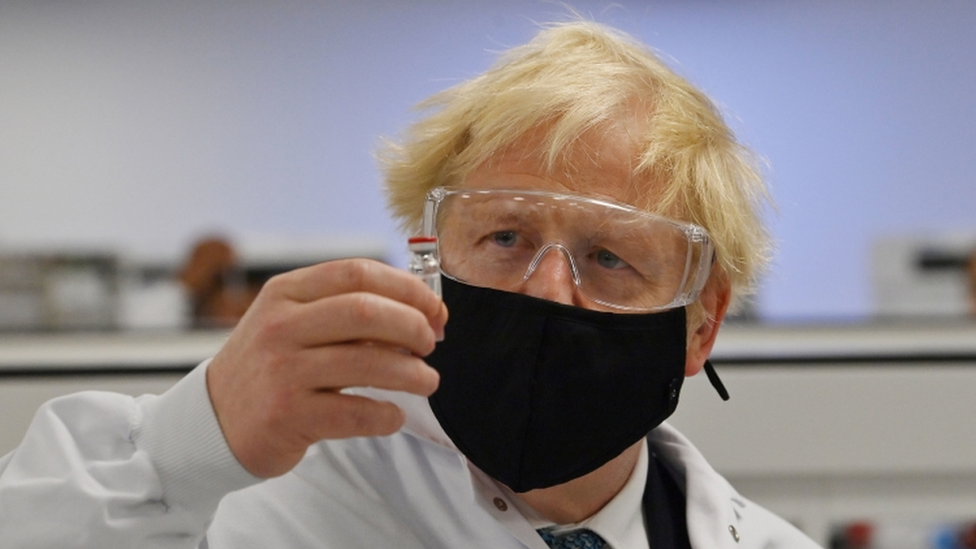
Boris Johnson saw one of the labs which will make the Oxford/AstraZeneca vaccine in Wrexham
"It's on the scale of the smallpox vaccination campaign [in the 1960s]," said Dr Richardson.
There is hope that the take-up will be at least 75%.
It will be "well into next year" before the entire Welsh population has been vaccinated though, according to the Chief Medical Officer for Wales Dr Frank Atherton.
"It's fantastic news that we're going to be able to be starting this as soon as next week but everything else depends on when we get stocks and how quickly we can start to roll it out."
Who will be vaccinating me?
There is a balancing act in staffing the programme from within the NHS, to ensure not too many people are taken away from where they are needed.
In the early stages, those who are already registered to vaccinate - with oversight by senior pharmacists and specialists - will be used to administer the vaccine.
More people, including those that have not administered vaccines before, will be trained up in the coming months.
Health boards are already recruiting retired nurses, midwives, pharmacists and therapists to train up.
How many doses will I need?
Those being given the Pfizer/BioNTec vaccine will receive two doses, three weeks apart.
But the effectiveness of the vaccines will be studied to determine what form of immunity the vaccine gives and how long it might last.
That in future could determine whether people need to be vaccinated again in future. The different vaccines might well have different characteristics on this.
But Dr Richardson said they offered a "fantastic message of hope"
What will I need to do afterwards?
Public health experts say you will still need to keep to guidelines around social distancing, hand-washing and using masks. Not everyone will be able to have vaccine and certainly not in the first phase. It will take some time to get back to normal.
"While vaccines are part of the answer, they are not the whole part", said Swansea Bay health board's public health director Keith Reid.
He is worried that people might think "we are all saved and this will all soon be over".
What else do I need to know?
You will not be able to mix and match between the vaccines - once you have received the first dose you must stick to it.
It is also not recommended you get the jab within 28 days of testing positive or from when you first have onset of Covid symptoms.
Beyond that, it is worth noting that previous exposure to Covid will not affect your eligibility for the vaccine or position within the priority list.
Related topics
- Published15 February 2022
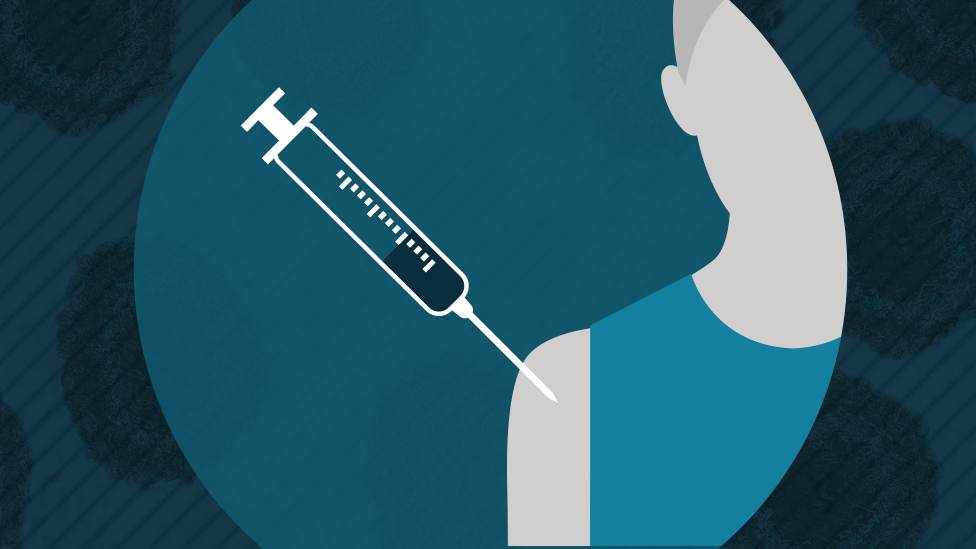
- Published2 April

- Published27 November 2020
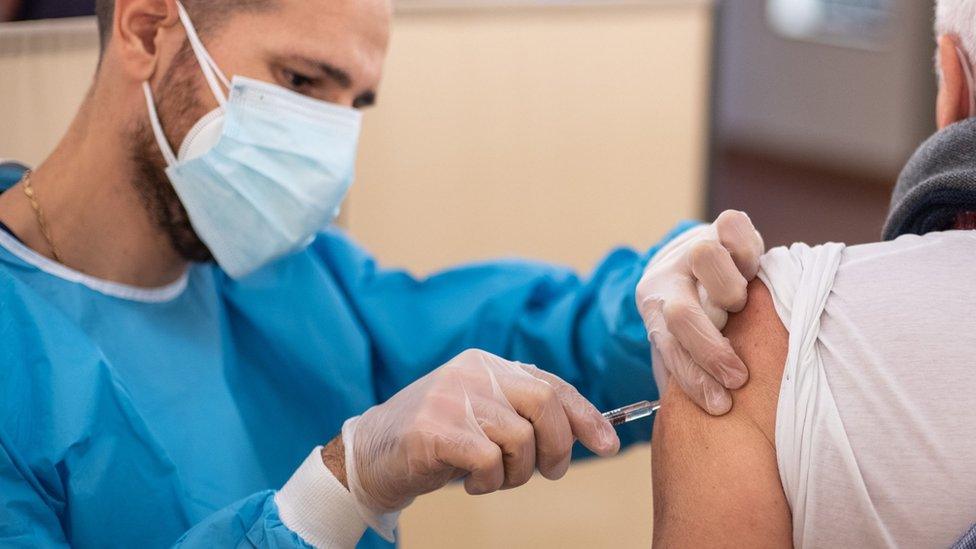
- Published28 May 2021
